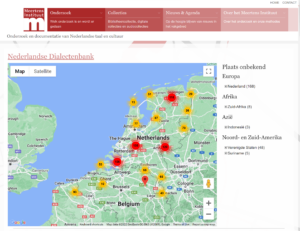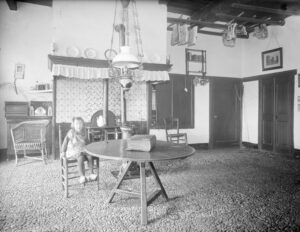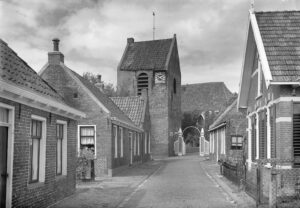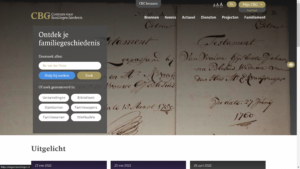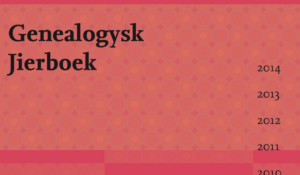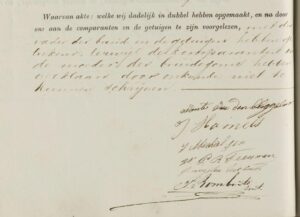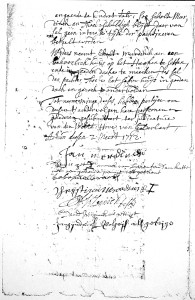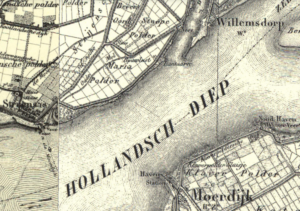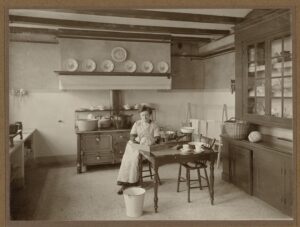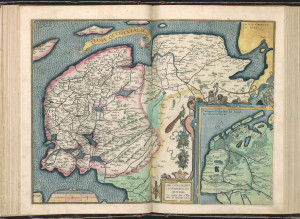In the Netherlands, every region, sometimes every town, has its own particular dialect. If you want to hear how the people in your ancestors' region sounded, you can listen to audio clips at the Meertens Institute website. Click on the + before the province Click on the name of the town, which will open a pop-up with a list of recordings. Click on "Afspelen" [play] Most of the clips are anonymous. You can also click Kaart [map] to see the recordings on a map or click the Opnames … [Read more...]
Quick tip – Look at old photos
Looking at old photos can tell you a lot about life in the times of your ancestors, even if the photos were not of your family. Take this photo of an unidentified Winterswijk farm in 1937, for example. Since I am related to just about everyone from Winterswijk, the child in the photo is probably a distant cousin of mine. We can see that the she is wearing long stockings above her wooden shoes, telling us the photo was probably taken in winter. She is sitting on a wooden chair with a … [Read more...]
Dutch Term – Nederlands Hervormd
Nederlands Hervormd means Dutch Reformed, a protestant religion. You may come across the term in population registers or church records. The Dutch Reformed church adopted that name in 1816. Before that, it was known as Nederduits Gereformeerd [Nederdutch Reformed]. There are many other protestant religions that split off from the main Dutch Reformed church, including Gereformeerd [Christian Reformed]. … [Read more...]
Dutch societies with members-only databases or transcriptions
Most genealogical information in the Netherlands is available free of charge. Government archives are required to make existing information available free-of-charge. This is why you will not be charged to access online records at the websites of Dutch archives. Private organizations can charge for access. Some organizations have created databases or transcriptions that are available as a member benefit. Here are some examples. Please note that the websites of these organizations are … [Read more...]
Quick tip – Frisian genealogy yearbooks online
The Genealogysk Jierboek [Genealogical Yearbook] is a publication about Frisian genealogy. The issues from 1951 to 2020 are online. The articles are in Dutch or Frisian. … [Read more...]
Quick tip – Signatures in Civil Registration Records
If you are looking at a civil registration record, the last part will identify who signed the record. If any of the people were illiterate or had other reasons not to sign, it would say so. Example: Biggelaar-Rens marriage record On 1 May 1858, my ancestors Hubertus van den Biggelaar and Anna Maria Rens were married in Terheijden. The bottom of their marriage record described who signed the record. It was signed (translation) "with the father of the bride and the witnesses, while the parties … [Read more...]
Dutch term – Huur
Huur is a noun meaning rent. The verb huren means to rent, and verhuren means to let out (huren is from the viewpoint of the renter, verhuren from the viewpoint of the owner). Many people rented houses and/or land. Historically, most people in the Netherlands were too poor to own their own houses, and rented them instead. The owners were often richer people in the town, noble families, churches, or (especially in earlier periods), monasteries and convents. Some rental contracts were made … [Read more...]
How Adriaan Marijnissen died
In May, I wrote about my ancestor Johanna van Groezen, who became a wife, mother of two children, and a widow; all in 1864. Her husband Adriaan Marijnissen died in Strijen on 29 October 1864 at the age of twenty-six.1 I had been unable to find out how Adriaan Marijnissen came to die in Strijen, away from his residence in Made, or how he died, since Dutch death records do not include the cause of death and I was unable to find anything in newspapers. After publishing the article, I decided to … [Read more...]
Dutch term – Keuken
The keuken is the kitchen. You may come across the term in estate inventories, where the items in the house are tallied by room. Kitchens originally had open fires, then hearths, and in the 19th and 20th century this gradually changed to stoves. Small houses where poor people lived did not typically have a separate kitchen. They would cook over the hearth fire or furnace in the living room. … [Read more...]
Dutch Genealogy News for July 2022
Here is an overview of all the new sources, websites, and projects that were announced last month. Sources Over a million scans of notarial records of Overijssel (1811-1925) have been added to the finding aid. Almost 60,000 of these scans have been automatically transcribed. These transcriptions are available via Zoek in transcripties. Church membership records of Steenwijk (1721-1882) have been scanned and indexed and can be searched via the Steenwijkerland municipal archives … [Read more...]
